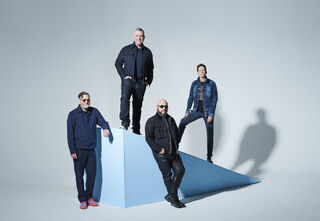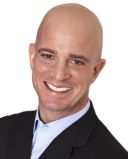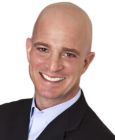Career
How Ed Robertson Stopped Feeling Like “The Spare”
A founding member of Barenaked Ladies shares his path towards self-acceptance.
Posted July 20, 2021 Reviewed by Abigail Fagan
Key points
- A key factor that affects overall well-being is if and how people feel connected their parents.
- Ed Robertson, musician, songwriter, and founding member of the band Barenaked Ladies, shares how not being connected to his father affected him.
- By focusing on making the best music and putting on the best shows that he can, Ed has come to feel more stable and secure.
One of the most fundamental questions we ask ourselves is “Am I OK?” It’s a general and loaded question without a clear and definitive answer. We just sort of know when we feel “OK” and that we are accepted, wanted and needed by the world. There are many factors that can make us feel unsettled and, therefore, unable to answer that question. But one of the main occurrences that can make us question if we feel OK is if we don’t feel connected to our parents.

Ed Robertson — musician, songwriter, and founding member of the band Barenaked Ladies — talked with me about the effects of not being connected to his father. This concept was one of the themes of the band’s new album Detour de Force.
Robertson shared that he felt his father’s struggle with alcoholism and depression interfered with their connection and contributed to Robertson feeling like he questioned whether he was OK. “My dad was a high functioning alcoholic. He never missed a day of work. But also never communicated a note of appreciation to me or love or attention, really. He was completely disconnected...,” Robertson told me. “He...came home from work every night … drank, or just very depressed, very disconnected.”
Contributing to an overall sense of instability was what Robertson described as incidents in which his father was driving while intoxicated. “My dad lost his license with me in the car twice, in the kind of late 70s ... This was in an era where, if you're a little tipsy, the cop said, ‘Make sure you go straight home,” Robertson recalled. “And to have that feeling as a kid, a little kid in the backseat, watch your dad have to move over and your mom have to drive the rest of the way and then realize your dad's taking the bus to work for three months because he lost his license. That happened twice. And it just created this feeling of lack of safety.”
Robertson’s feeling of insecurity was exacerbated by his belief that his parents did not intend to have him. He referred to himself like an extra tire on a car — a “spare.” “I joked about it as a kid that I was the spare … I have four siblings and they were all like a year apart. And then there's this six-and-a-half-year gap and then me,” he said. “My parents were kind of out of the cycle of parenting. I was the extra kid. I was the accident. And I felt like I wasn't really part of the plan. And there were always jokes about it. But you take that sh*t to heart when you're a little kid and you think like, ‘Oh, I'm not I'm actually not supposed to be here.’”
Overall, Robertson felt insecure and unsafe as a child. He did not feel like he was OK — and reported needing external approval from others to fill that void. Robertson felt that he became a performing musician in part to address this need. “I don't think a lot of people get into show business without some form of insecurity,” Robertson explained. “You desire external approval and reinforcement that what you're doing is good and right … I think that motivation was huge for me. I really needed external approval.”
And Barenaked Ladies had all of the success one might want. Their fourth studio album Stunt has sold 4 million records and includes their enduring hits “One Week” and “It’s All Been Done.” They have won multiple Juno Awards (the Canadian equivalent of Grammy Awards) and are inductees into the Canadian Music Hall of Fame.
Unfortunately, Robertson found that the external reinforcement he craved did not work. He still did not feel OK. “It took me decades to realize that wasn't cutting it, that no matter how much approval and success I got, I was still lacking because I was fundamentally insecure. And I lacked personal confidence and approval,” Robertson described. “I put a lot of work into that … Getting to a place where I felt comfortable in my own skin and felt proud of what I was doing for its own sake.”
One of the most important aspects of Robertson feeling grounded in his own sense of stability and self-acceptance was when he recognized how he approached writing and performing music. First, he recognized that when he worked on his music with collaborator Kevin Griffin of Better Than Ezra, he was actually very open to criticism and negative feedback. The reason was that his commitment to the quality of the music created a context in which all feedback — good or bad — was in service to his purpose of making the best music he could.
“I've been writing for 10 years with Kevin Griffin. And we throw ideas back and forth at each other and we’re ruthless with each other. Like, just the criticism is not only meant to serve the song, but it's meant to make each other laugh. And it's this playful kind of ego battle between the two of us. And it's fun and hilarious. And it never, it never feels like an attack to me...,” he explained. “So, when he goes, ‘That's a terrible line,’ I go, ‘Yeah, that's terrible… you come up with something better.’”
And Robertson realized that just as writing the best song he can is of the utmost importance, so is playing the best show possible. “When I go out on tour, my mission is to entertain … That's what I'm super proud of. Throughout the long career of this band, we put 1,000% into every show. And we leave it all on stage to entertain each crowd. And we don't rehearse a tour, and go out and do the show in every town. We rehearse songs, and then we go out and do a different show in every town we go to. And it's, it's unique to that night, it's unique to that space, it's unique to that time and place. And it's a tightrope walk that we've been doing for 30 plus years,” he said. “What I'm super proud of is that we're still doing this. And we're doing it at a high level and where we still like each other. We get along as a band. We create together. We work together. It's like that's the real award is the fact that this career has been so long and fruitful.”
Over time, by focusing on his purpose to make the best music and put on the best live shows that he can, he has felt more stable and secure — more OK. But he realizes that the process of feeling OK is not like a gate that he breaks through and then feels better permanently. He recognizes that he needs to keep working on how to connect with himself, his music, his band and collaborators, and his fans over time.
But in contrast to the judgment of others – he has control over his commitment to his purpose in music. “I'm grateful for the life that I have and … giving myself the time to work through my own sort of shortcomings and personal struggles … But it's a journey. It really is a journey. And it's easy to say, ‘Well, you know, your dreams have come true. You're a musician — you had successful records and tours and for decades you have it easy...,” Robertson described. “Well, I've got some deep seated sh*t that I needed to work through. And I needed people around me to be a little bit patient with that. And I'm grateful that they were.”
Robertson feels that this sense of stability and security has also translated into his being willing to take on scarier and darker themes in his music, such as his experiences with his father. “So now I can write songs about things that were a little more raw for me,” he said. “And earlier in my career, I was kind of afraid to touch those nerves because it was like unraveling … There's a big tightly wound ball of yarn there, and I don't want to pull at the threads too much, because the whole thing is gonna unravel. And, you know, I've got the confidence to go to those places a little more now.”




